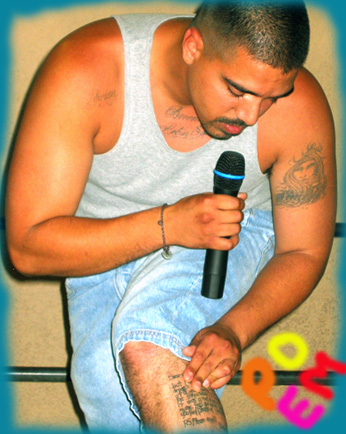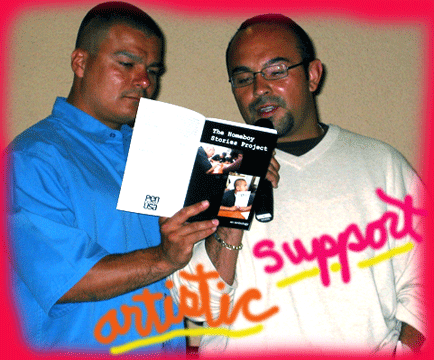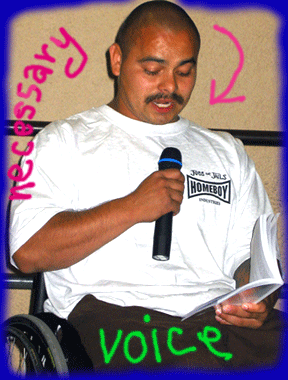
Poet Joseph Holguin
I happen to love poetry. By that I mean that I buy books of poetry on a regular basis. I go to poetry readings. I also read poetry aloud to myself in the privacy of my own home. (Worse, I often make myself cry doing it, which—in addition to being sort of pathetic—tends to upset the dog.)
In short, I’m into it. But, as much as I love the form, any poetry reading that goes much beyond, say, 45, minutes, starts to make me feel fidgety or sleepy—often both. I suspect this is true for a lot of people if they are honest about it.
But not Saturday night.
Saturday, if you’ll remember, was the first of two public readings for the Homeboy Stories Project.
[The second reading is this Wednesday night. For details see below, and for backstory on the project, click here]The evening, which consisted of ten homeboy and homegirl poets reading their work, went on for nearly two hours—mainly because, at the urging of the crowd, the writers kept coming up for encores. Yet, nobody fidgeted. Nobody nodded off. In fact the audience pretty much had to be crowbarred out of the place. The readings were that dynamic, the poetry that risky, alive, funny, devastating.
Perhaps the night’s most startling moment was when a former homeboy named Joseph Holguin, yanked up the hem of his blue denim shorts, and read a poem he had tattooed on his leg. The words, he said, came from a letter his son had written to him when he was in prison. It was this letter/poem that triggered the internal change, Joseph said, that ultimately allowed him to turn his life around.
The complete text of the letter/tattoo/poem is after the jump.
Dear dad,
I don’t have much to say
but I want you to stop doing
drugs. I don’t want you to die at a
young age. I want you to
be there when I have a child.
It was a sad moment when
my mom told me what happened
to you. Well, that’s all I wanted
to say.P.S. Please stop.
Sincerely, your first son.
I love you.
This second poem—another Joseph read Saturday night—was written about his children more recently.
For My Children
by Joseph Holguin
You run through me like blood
through my veins,
every drop meaning
life and joy within.
You are the whole
reason I live,
every breath I take
followed with thoughts
of making you happy.You are every beat of my heart
every lyric to my song.
Without you I don’t make any sense.Can a rainbow appear without sunlight
To embrace it?You must hold me
so that I know I amloved.
While Joseph’s leg-baring recitation got everyone’s attention, the whole evening was rife with subtle drama. For instance, whenever it came time for Gerardo Gamez (Gera) to read, he would roll slowly and deliberately to the front of the room in his wheel chair, set the brake, then I’d hand him the microphone. Certainly, lots of Americans use wheel chairs. So there’s nothing inherently unique about his actions. But his soft-spoken dignity as he recited poems like this one, gave him a kind of emotionally naked radiance.
Go Around
by Gerardo Gamez
Just one thing that I will say
I personally said it
that I’m enjoying my days out here.
My freedom, even though I carry pain inside
so deep that sometimes I don’t know how to get out.
But the only way is by me doing the best thing
that could help me in life.
Another thing I mentioned before
It’s hard being in a wheelchair.
Let me explain why it is hard being in this position.
When I see a lot of stairs
And by me knowing that I won’t be able to go up
It gets me mad and hurts me so much that sometimes I wish
that I wouldn’t be here.
But I can’t think like that anymore.
I know that I’m better than that.
So what I do is that I have to go around.
Something similar was true of Agustine Lazima (Tin-Tin). Tin-Tin, if you’ll recall, is the one who had his hand shot off when he was twelve. Yet as he gave his readings on Saturday, the striking thing was not so much the absence of his hand, which he obscures by keeping his lower left arm in his pocket all the time, it was the easy cooperation between him and another one of the poets, Hector Verdugo, who accompanied Tin-Tin each time he read in order to hold the book (or sheet of paper, if the poem happened to be a recently written one), so that Tin-Tin could hold the mike in his only good hand.
Of course the subtext running beneath such moments is the fact that each one of the men in the room—Tin-Tin, Hector, Gera, Joseph and all the rest—were once in gangs that may or may not have been mortal enemies with the gangs of the others in the room. Or to be more specific, the former homeboys of one of the poets may easily have been responsible, once upon a time, for the maiming of one of the other poets. (Or for the shooting death of a poet’s close friend, or cousin, or in Tin-Tin’s case, of a younger brother.) Yet now, although they constantly kid around with each other, when it came to listening to and supporting each other’s writing, nothing but the deepest sort of kindness seemed evident between them.

Hector and Agustine
At some point, Tin-Tin blurted to novelist Leslie Schwarz, the project’s co-director and creative writing teacher, “Thank you for helping me find my soul.” In reality, however, Tin-Tin’s big-hearted soul had already been clearly in evidence. Leslie had helped him find his voice.
Wine
by Hector Verdugo
Born fresh with water to grow
Delicate flesh that’s in need of
nourishment and influence
My vine grown in a valley
Where winos piss and dogs sniff
As I grow I’m mixed inside with
sour and sweet
I’m a grape yearning to be wine
Squash me.
See my soul, my flesh
Spill its juices.
Let it stand exposed
Rotting for all to see
I sit still marinating in ghetto air
I fill your glass, sip me.
Let me overwhelm your pallet with
My excitement, taste my rage,
Mixed with honor and passion, swish me in your mouth
And taste the hint of humility, love, and hate.
Swallow and feel me instantly intoxicate your soul.
My potent wine will allow you to feel things
You haven’t felt before and see things you might not have seen
Share with me the opposite sex
And I will take you to erotic peaks
You have not been before. Drink me among associates
and I will expose wolves disguised as sheep.
Sip me amongst friends and family
and renew your soul with love and laughter.
You will wish not for the night to end.
You’re intrigued by my color
deep red, my exotic flavor, and potency.
You wouldn’t dare call me an insignificant bottle of wine,
my label says 1974 the ghetto of Los Angeles
from an alley where winos piss and dogs sniff.
By night’s end, there were dozens of poems read. But among the last and most compelling was a still unfinished piece, again by Joseph Holguin. (He’s still polishing the end of the thing, or I’d reproduce it here.) Before he read the poem, he told us all a story about how it came into being.
He said that the night before—this past Friday night—he’d learned that his brother-in-law had been beaten nearly to death in some kind of fight. The brother-in-law was in intensive care, still alive, but his prognosis was very uncertain. “This man raised me like a father,” Joseph said, “so when I heard, a part of me wanted to go out and get revenge.” In his younger days, he admitted, that’s exactly what he would have done.
“But instead,”Joseph said, after a steadying breath, “I took all those feelings….and I wrote a poem.”
*******
Later, as the crowd filed out into the warm night, a friend of mine who is a public defender, asked about ordering a bunch of the Homeboy Stories Project anthologies. “I want to give them to every criminal prosecutor and judge I know,” she said. “They need to read this stuff, and remind themselves that rehabilitation is possible. And that it’s…you know…. preferable.”
*******
THE HOMEBOY STORIES PROJECT – NEXT RECEPTION AND READING: Wednesday, July 18th 6:30 PM (Reading starts around 7:15 pm)
Crossroads School,
Roth Hall, Trives Administration Building
1714 Twenty First St.,
Santa Monica, CA 90404
UPDATE: I didn’t have the exact text of the letter/poem on Joseph’s leg until this morning. But, as you can see, I’ve now added it in.


Wow, thanks for bringing that to us Celeste.
I’ve been here three times.
Confronted the empty comment window three times.
Too hesitant to respond, I’ve left three times.
The blinking cursor mocks me.
Feelings fail to distill into words.
Language deserts.
Their voices are too powerful, too true.
Only the poet in me, could answer the poet in thee.
And, my poetry is but a pale, whispered echo.
Their’s are songs of the soul, Celeste. Thank you, and the Homeboys, for sharing them.
Nice, LotS. I can do poetry, too.
There was an old man from Nantucket….
I better stop. Celeste may cry at that poem.
Celeste, this is a good post for which there really isn’t much that one can say, since there’s little, if anything, to add to what you shared. In fact, this told me a lot more about youself than I previously knew. Your sincerity is evident and your compassion is great. (I got that from a Chinese fortune cookie. Okay, not really.)
Thanks for the kind words, guys. (And for the poem, Listener.)
In the 80’s, prior to the ADA of 1990, I helped carry a friend “wheel chair and all†thru a restaurant with steps everywhere, which were impossible to navigate for a person in a wheel chair. Gera’s poem “Go Aroundâ€Â, reminded me of that day and of the progress we have made and continue to make as a society in this area.
http://en.wikipedia.org/wiki/Americans_with_Disabilities_Act_of_1990
On my street, the city has SLOWLY been cutting the curbs and putting in ramps to assist those who a curb is a major impediment along with a detectable warning surfaces for the blind where the curb used to be.
Legislatively, the theory behind the ADA is the need to level the playing field for disabled Americans. I believe we should apply this same strategy in many areas of our society.
The nature of business is to be competitive which often results in behavior which is destructive to our society. For this reason I have always believed in leveling the business playing field thr ough legislative laws which tend to improvement our society.
The US has several areas which we all know could be improved by passing and enforcing legislation, which raises the societal playing field while keeping it level for business competitors at least in the US.
Examples of possible legislation which could improve our society include:
Healthcare – Universal:
a. Require all employers to provide healthcare insurance for all employees.
b. Require insurance companies to ignore medical history & existing conditions.
c. Provide health insurance for the un-employed along with un-employment insurance.
d. Double the number of medical schools in the US and Export doctors.
e. Set a maximum payout on medical liability suits and max attorney fees.
Energy – Green/Self-Sustaining:
a. Require utilities to generate power from increasing % of green/clean energy.
b. Require cars and trucks to use an increasing % of green/clean energy.
c. Require new construction to be increasingly efficient and self sustaining.
Anyway just as the ADA has helped my friend in the wheel chair, proper legislation can help us improve the lives of our people.
Pokey: “ignore medical history & existing conditions.”
Pokey, I sure hope you mean “PRE” existing conditions, too often insurance companies including medicaid and medicare ignore “Existing Conditions.” 😉
Pokey, you sound like a leftist when you want to mandate that all employers provide heatlh insurance and that electrical power be generated from more green and terribly inefficient means of generation. Why don’t we tell people who want insurance to not take jobs that don’t offer it and tell utilities to go whole hog with nuclear power?
You generally write brilliant comments. Did someone else use your name or are there a good and evil Pokey’s?
[…] bright, gentle man who’d been one of the stars of the poetry project I wrote about earlier. (Actually all three were involved, in one way or another.) Agustine talked about how he’d had his hand shot off […]
[…] of LA Observed will do doing a panel on blogging, my pal Leslie Schwartz will have a panel of fabulous homeboy poets, and there will be a string of other stellar personalties. This book fair started small and has […]
[…] as beautiful as the new building is, the move was not made without some anxiety. For instance, Joseph Holquin is a former drug addict/former homeboy who has served time in prison. Now he’s a well-liked […]
[…] at Homeboy Industries as part of our PEN USA-sponsored Homeboy Stories Project that I posted about here and here last […]
Mr. Verdugos “wine” poem is amazing. I love it.
Love joseph holguien his poems are breath taking and even though i may have read them serveral times its always as if it is my first..